#Marry Anne/Mariana
Explore tagged Tumblr posts
Text

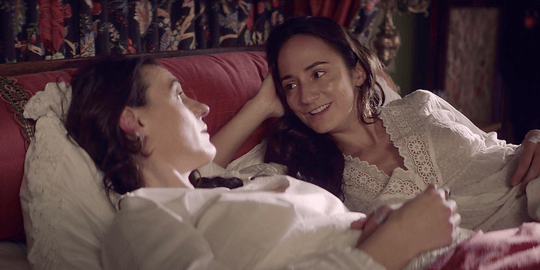


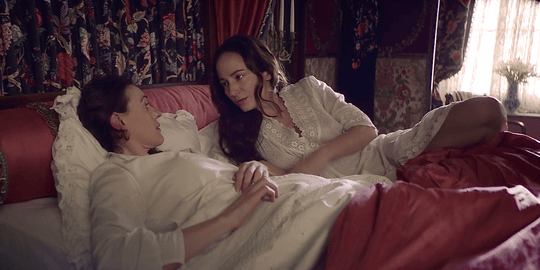
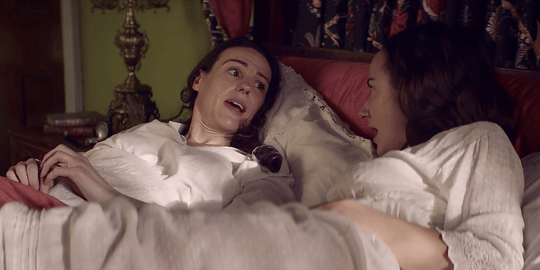


Gentleman Jack, S01E07 (2/2)
MARIANA LAWTON “Seriously, you asked her to marry you? To - (she whispers, even though there’s no real need to) To exchange rings? And alter wills? And move in?” ANNE LISTER “Yes. Well. I hadn’t raised the matter of wills yet, but - (MARIANA goes quiet and thoughtful) What’s the matter?” MARIANA LAWTON “All the things we talked about doing?”
#lydia leonard#mariana lawton#gentleman jack#anne lister#suranne jones#sally wainwright#season one scripts#01x07#But Freddy you're married to me#All the things we talked about doing#sorry but I am#team mariana
85 notes
·
View notes
Text
I've started reading Anne Lister's (early 1800s lesbian) journals, some highlights:
where they start off, she's accompaning her ex-its-complicated (Mariana) who just got married on her honeymoon. Anne responds to this heartbreak by fucking Mariana's sister (also along on the honeymoon)
she is also an absolute dirtbag towards this sister (confusingly also named Anne aka Nantz), "she would gladly have gotten into bed or done anything of the loving kind I asked her", "I said she excited my feelings in a way that was very unjustifiable unless she meant to gratify them"
part of how she explains she's gay to Nantz is saying how pretty hr sister Eliza is. Notably this is not the sister that Anne has been dating.
then she immediately drops Nantz and makes a snide note that "superior charms might not be so easily come-at-able on such easy terms"
Later she meets back up with Mariana and then proceeds to spend so much time hanging out with yet another sister (Lou) that Mariana gets jealous, which Anne glosses over in a way that might read more heartfelt if she had not previously a) noted that one of Mariana's sisters was very pretty or b) slept with another one
On the one hand she is such a snob towards her neighbors, but on the other its clear she's acutely aware that they are all aware she is Different and are gossiping about her, so I find it hard to hold the classism against her
her idea of flirting with a local middleclass girl she meets is to send her a poem about having a temporary fling with a social inferior. Luckily she does not go through with this idea, but big Darcy energy
at one point she buys a pistol and shoots out of her window and the recoil knocks it out of her hand so dramatically that the pistol smashes the glass
so much of these journals are about finances, which I'm sure the historians adore, Anne keeps noting down how much everything cost
There's some interesting gendered bits going on in her: Anne mentions at one point sitting in just her underwear and men's suspenders, and mentions "the abuse I had received for [...] manners like those of a gentleman". She's also very focused on getting a full (masculine) education: classics, math and science, etc, and there are multiple places where she notes particularly when a(n unfamiliar) man treats her intellect as an equal.
there's one long bit that really gets me where she goes on for a while about the various expenses of traveling by coach and ends it with "Any gentleman might travel on these terms, if he chose to go into the traveling room & was sure of being well received so long as he did not give himself airs, but behaved like a gentleman. Indeed, he said, many gentlemen did travel in this way..."
gods I wish she lived in a time where she could be butch
Anne Lister kept parts of her journals encrypted, mostly the lines to do with her sexuality, and there's a strange poetry in the way this collection renders the encrypted text in italics, queerness once unreadable but still written plainly alongside the deniable straightness, "Had a hot supper & did not get back until 3. I slept with M---"
(full part 1) (part 2)
889 notes
·
View notes
Note
Huh, I had no idea people were being weird about the real facts of Anne Lister's life (I don't do much fandom stuff). I specifically liked the show because the relationship was messy and had Anne being problematic.
But I was asking mostly for the costumes. I love watching just for that because they really pulled out all the stops. Everyone is perfectly fitted, and the appropriate hairstyles. I love the masc dress for Anne.
I'd give it a skim just to appreciate the costume department because the attention to detail is stunning.
Yeah it was so strange to see. Someone's URL was literally "Ann Walker Not A Bottom For Long" or something and I was like. well Anne Lister was a stone top, as we'd say today, so... They treated these real people like fictional characters and then got mad when they were in fact. Real people. and that's how their relationship really went.
It did look pretty good costume-wise from what I saw! wasn't a fan of the buckles- little side curls -on Anne; they look frumpy, IMO, and they weren't even still a sign of masculinity back then. they were very much out of fashion by the 1830s. plus they're not present in the only known portrait of her from life
maybe I'll give it a watch sometime! it also sounds more sympathetic to Mariana Lawton than The Secret Diaries of Miss Anne Lister, which is a plus (seriously, Anne, not everyone has a vast estate to which they are sole heiress. some women still have to marry to support themselves)
31 notes
·
View notes
Note
came back . opinions about period dramas ? would want to watch something lately !! but my french taste its too big to watch period dramas who arent french , you may know better than me about non - french stuff ?
Thank you for your Question
I love period dramas especially if they are historically accurate and entertaining. I like how historical dramas references real life events. Example: The Crown, The Gilded age, The Ministry of time, Downton abbey, and Maria Theresia.
The historical dramas that I would not prefer are the ones that bastardize the historical timeline, costume, and characters. Example: The Tudors, Blood, Sex, and Royalty, The White Princess, and the Spanish princess. (The siesta part made me cringe) They made Margaret Beaufort and Elizabeth of york evil. The White Princess. Her affair with Richard 🤢. I hated when historical drama put modern music into a period drama and movie. ( It can work if it is instrumental and it does not take you away from the period to much example: Bridgerton) but If said music is so modern that it takes you away from the historical setting it just feels wrong Example: Gladiator 2 (A movie that did not need a sequel)
I hate it in period dramas if they decide to insert a 21st century feminist character. In a time period where women are barely educated about their rights. Don't get me wrong there are historical women who are ahead of their time and made great contributions example: Harriet Tubman, Risa Parks, Joan of Arc, Anne Frank, Catherine the Great of Russia, Maria Theresa of Austria, Mariana of Austria, and Marie Curie. There are characters I see in historical dramas that carries beliefs such as refusing to marry, A Mary sue, and I do not need any man trope. These tropes often make these characters annoying and unrealistic.
There is a Spanish Movie about Carlos III reign mainly focusing on esqhilache time as prime minister. Isabel was in the movie. she was amazing! My favorite scene is her discussion with esqhilache. Carlos III in the movie is so cute. I love him.
@chateau-de-gamin @catherinemybeloved @rmelster
#history#just my thoughts#period drama#please dont hate me#Feel free to share your thoughts#spanish princess#Historical drama#my rants#gladiator 2
14 notes
·
View notes
Text
So, as a Gentleman Jack fan that just the other day saw s2 ep4, I should probably say something about the whole Anne L cheating on Ann W thing with, as I like to call her, Torpedo Mariana (named after the trope Relationship Torpedo, a.k.a. in-universe anti). Because I've seen people claim that it was out-of-character, and I don't really agree, but I also can see where people are coming from.
Okay, so the thing about Gentleman Jack that I actually really love is that it requires very little mind-reading. Anne Lister's fourth wall breaking asides, while infrequent and a bit distracting, are actually pretty good in filling in the gaps when it comes to her thoughts and feelings, while other characters are surprisingly easy to read - either because they are relatively simple, or because they express their feelings openly at some point (well, as openly as the customs of biedermeier Britain allow them). And just to be clear, I DON'T LIKE MIND-READING. Ambiguity can be a useful tool for writers, but to be honest it's not very enjoyable for me as an audience member. One of the biggest flaws of House of the Dragon in my eyes is just how unclear it is with the characters' thoughts and motivations. I don't like that I have to outright speculate what Alicent is thinking at any given moment, only to learn all too frequently that actually, she was thinking something completely different, you silly goose. Spare me that nonsense.
My point is, unpacking Anne L's feelings towards both Ann W and Torpedo Mariana does actually require a fair bit of mind-reading. My interpretation is that her relationship with Torpedo Mariana after the latter's marriage is extremely volatile, even toxic, and by the time the show starts, she's quite sick of her. Her reasons for courting Ann W are quite complex - financial, certainly, but also genuine attraction that over time develops into infatuation, even love. But that of course doesn't mean her feelings towards Torpedo Mariana disappear completely, oh no! This trainwreck has not yet shown us its final explosion. So Torpedo Mariana is totally wrong when she claims Anne L doesn't love Ann W, but does kinda have point in thinking she might still have a chance with Anne L. It also has to be said that Anne L can be a bit of dick sometimes, mostly to people who deserve it, but not always. Like, for one example, Torpedo Mariana's actions in marrying Charles Lawton and not running away with Anne L were completely understandable, yet Anne L sees them as this utter betrayal and is mad at Torpedo Mariana for the rest of her life, even as she continues to meet up and sleep with her. The toxicity in their relationship really isn't a one-way street. So what happened here is that Torpedo Mariana continued to insist that Anne L doesn't love Ann W, because the other option, that the only light at the end of a tunnel that is her life has just been snuffed out by a cute rando, is simply too unbearable. Well, that, and she also can see Anne L still has feelings for her, not understanding that this doesn't invalidate Anne L's feelings towards Ann W. She seems to lowkey convince Anne L of this, and after Torpedo Mariana reminds her of the good old days and activates her protective instincts, Anne L succumbs to temptation. Not very romantic, but sadly realistic when you really think about it. It's basically the good old "slipup with an ex" plotline, a scenario so common it borders on cliche. So no, I don't see it as out-of-character, not by a long shot, but I can see how some people who didn't pick up on Anne L's flaws and her feelings towards Torpedo Mariana (as well as Torpedo Mariana's unreliable narrator status; guys, OF COURSE she claims Anne L doesn't love Ann W, and even the fact that Anne L doesn't deny it is explainable by things other than "Torpedo Mariana is right") might see it that way.
3 notes
·
View notes
Text
Anne: Alright, so you and I are married.
Mariana: We are not married.
Anne: It’s pretend.
Mariana: I don’t want to pretend.
Anne: Scared you’ll like it?
Mariana: Okay, if we’re married, I want a divorce.
Tib: Are you two like this all the time?
Both: Yes.
11 notes
·
View notes
Text
Anne Lister, the lesbian diarist dubbed "the first modern lesbian"

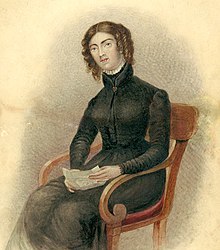
L by Joshua Horner (c 1830), R by Mrs. Turner of Halifax (c 1822)
Anne Lister lived from April 3, 1791 - September 22, 1840. She was an independent landowner from England who was noted to always be dressed in black and not partaking in typical femininity. She became well known after her death when her diaries were discovered and decoded. The diaries were written from age 15 until her death, parts written in code, and detailed her history of attraction and relationships with women.

“Burnt Mr Montague’s farewell verses that no trace of any man’s admiration may remain. It is not meet [meant] for me. I love and only love the fairer sex and thus beloved by them in turn my heart revolts from any other love than theirs” 29 Jan 1821 – written in Anne’s journal [reference SH:7/ML/E:4]
She did not appear to be ashamed of her sexuality as she would openly court women she was interested in and had many lovers. Her first love was a pupil and roomate at the Manor School in York when she was 15, Eliza Raine. It was with Eliza that she developed the code she would use in her diaries to write notes back and forth with. The first entry in Anne's diary was "Eliza left us." Her second named lover was Isabella Norcliffe and she remained an occasional lover through the remainder of her life but rejected her as life partner, perhaps because of disagreeing with Isabella's drinking. Isabella then introduced Anne to the woman that would become the love of Anne's life, Mariana Belcombe. Mariana married a man even though it upset Anne but they continued their affair for a while after. She eventually told Anne that she was ashamed to be seen with her due to her masculinity and they parted ways. Mariana would later try to get Anne back when Anne inherited a large amount of money and the Shibden Hall but she rejected her. She went on to marry (as a church blessing, not legally recognized) Ann Walker because she met her social standing. This would be the first gay marriage in England. Anne passed away six years after their marriage.
Her wearing all black everyday was a public statement to others of her being different, as at the time young unmarried women typically wore white or lighter colours while black was reserved for mourning. Men would yell and shout at her things like "are you a man or a woman?" and would follow her when she was in public. Because of her looks her nickname from the public was "Gentleman Jack". She largely didn't respect men as she believed to be more educated than most who only studied one subject.
“I know my own heart and understand my fellow man. But I am made unlike anyone I have ever met. I dare to say that I am like no one in the whole world” 20 Aug 1823 – written in Anne’s journal quoting Rousseau [reference SH:7/ML/E/7]
Anne was adventurous and liked to travel. She was the first woman to ascend Mount Perdu and the first person ever to ascend Mount Vignemale. At the time conventions called for women not to travel alone, they had to at least have a male companion to protect them. She did not abide by this and often travelled alone and later on with her wife. It was during her and her wife's visit to Russia that she was bit by an insect and succumbed to fever. She was 49.
Her diaries were originally first found by a relative of hers, John Lister, in 1890 but because John was also gay and feared his sexuality being found out if he broadcast her diaries, he reburied them. Later they would be found and translated in 1983 by historian Helene Whitbread. A section of her diaries remain lost.
"Writing my journal has amused & done me good. I seemed to have opened my heart to an old friend. I can tell my journal what I can tell none else." From Anne Lister’s journal entry of 16th September 1823.

Sources
https://www.annelister.co.uk/
https://museums.calderdale.gov.uk/famous-figures/anne-lister
#anne lister#people#lesbian#gnc#lgbt history#lesbian history#lgbt education#lgbtq#women in history#lesbianism#gender non conformity
10 notes
·
View notes
Text
1928-2014
By Dr. Kelly A. Spring | 2017; Updated December 2021 by Mariana Brandman, NWHM Predoctoral Fellow in Women’s History, 2020-2022
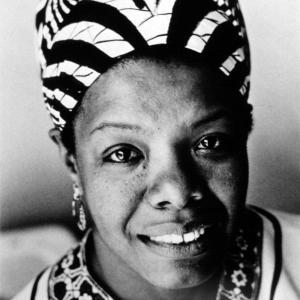
Poet, dancer, singer, activist, and scholar Maya Angelou was a world-famous author. She was best known for her unique and pioneering autobiographical writing style.
On April 4, 1928, Marguerite Ann Johnson, known to the world as Maya Angelou, was born in St. Louis, Missouri. Due to her parents’ tumultuous marriage and subsequent divorce, Angelou went to live with her paternal grandmother in Stamps, Arkansas at an early age. Her older brother, Bailey, gave Angelou her nickname “Maya.”
Returning to her mother’s care briefly at the age of seven, Angelou was raped by her mother’s boyfriend. He was later jailed and then killed when released from jail. Believing that her confession of the trauma had a hand in the man’s death, Angelou became mute for six years. During her mutism and into her teens, she again lived with her grandmother in Arkansas.
Angelou’s interest in the written word and the English language was evident from an early age. Throughout her childhood, she wrote essays, poetry, and kept a journal. When she returned to Arkansas, she took an interest in poetry and memorized works by Shakespeare and Poe.
Prior to the start of World War II, Angelou moved back in with her mother, who at this time was living in Oakland, California. She attended George Washington High School and took dance and drama courses at the California Labor School.
When war broke out, Angelou applied to join the Women’s Army Corps. However, her application was rejected because of her involvement in the California Labor School, which was said to have Communist ties. Determined to gain employment, despite being only 15 years old, she decided to apply for the position of a streetcar conductor. Many men had left their jobs to join the services, enabling women to fill them. However, Angelou was barred from applying at first because of her race. But she was undeterred. Every day for three weeks, she requested a job application, but was denied. Finally, the company relented and handed her an application. Because she was under the legal working age, she wrote that she was 19. She was accepted for the position and became the first African American woman to work as a streetcar conductor in San Francisco. Angelou was employed for a semester but then decided to return to school. She graduated from Mission High School in the summer of 1944 and soon after gave birth to her only child, Clyde Bailey (Guy) Johnson.
After graduation, Angelou undertook a series of odd jobs to support herself and her son. In 1949, she married Tosh Angelos, an electrician in the US Navy. She adopted a form of his surname and kept it throughout her life, though the marriage ended in divorce in 1952.
Angelou was also noted for her talents as a singer and dancer, particularly in the calypso and cabaret styles. In the 1950s, she performed professionally in the US, Europe, and northern Africa, and sold albums of her recordings.
In 1950, African American writers in New York City formed the Harlem Writers Guild to nurture and support the publication of Black authors. Angelou joined the Guild in 1959. She also became active in the Civil Rights Movement and served as the northern coordinator of the Southern Christian Leadership Conference, a prominent African American advocacy organization
In 1969, Angelou published I Know Why the Caged Bird Sings, an autobiography of her early life. Her tale of personal strength amid childhood trauma and racism resonated with readers and was nominated for the National Book Award. Many schools sought to ban the book for its frank depiction of sexual abuse, but it is credited with helping other abuse survivors tell their stories. I Know Why the Caged Bird Sings has been translated into numerous languages and has sold over a million copies worldwide. Angelou eventually published six more autobiographies, culminating in 2013’s Mom & Me & Mom.
She wrote numerous poetry volumes, such as the Pulitzer Prize-nominated Just Give me a Drink of Water 'fore I Diiie (1971), as well as several essay collections. She also recorded spoken albums of her poetry, including “On the Pulse of the Morning,” for which she won a Grammy for Best Spoken Word Album. The poem was originally written for and delivered at President Bill Clinton’s inauguration in 1993. She also won a Grammy in 1995, and again in 2002, for her spoken albums of poetry.
Angelou carried out a wide variety of activities on stage and screen as a writer, actor, director, and producer. In 1972, she became the first African American woman to have her screen play turned into a film with the production of Georgia, Georgia. Angelou earned a Tony nomination in 1973 for her supporting role in Jerome Kitty’s play Look Away, and portrayed Kunta Kinte’s grandmother in the television miniseries Roots in 1977.
She was recognized by many organizations both nationally and internationally for her contributions to literature. In 1981, Wake Forest University offered Angelou the Reynolds Professorship of American Studies. President Clinton awarded Angelou the National Medal of Arts in 2000. In 2012, she was a member of the inaugural class inducted into the Wake Forest University Writers Hall of Fame. The following year, she received the National Book Foundation’s Literarian Award for outstanding service to the American literary community. Angelou also gave many commencement speeches and was awarded more than 30 honorary degrees in her lifetime.
Angelou died on May 28, 2014. Several memorials were held in her honor, including ones at Wake Forest University and Glide Memorial Church in San Francisco. To honor her legacy, the US Postal Service issued a stamp with her likeness on it in 2015. (The US Postal Service mistakenly included a quote on the stamp that has long been associated with Angelou but was actually first written by Joan Walsh Anglund.)
In 2010, President Barack Obama awarded Angelou the Presidential Medal of Freedom, the country’s highest civilian honor. It was a fitting recognition for Angelou’s remarkable and inspiring career in the arts.
This woman was a woman of rape, abuse , and even a victim of racism. She stayed writing in her life as life went on and she did not ask other people to suffer either was well she was a woman of many gift. A big wake up for womens rights and also a good reflection on what is wrong with today's society. People use religion, marriage, laws and even age to determine what is and isn't rape and that is the sick culture all women have to endure. It is never a woman's fault. It happened to me recently and now I am diving back into my music arts. Even research as well . Getting different domains for different topics as well while putting my story out there . It is scary to put it out there because there are so many different things that make writing scary/
#today i learned#til#inventions#biochemistry#women in stem#electricity#mathematics#ocean#environment#sea
7 notes
·
View notes
Text
March Books
Why does this year feel like it's both dragging way too slowly but also speeding by way too quickly? I don't know. The husband and I are trying to be more mindful of our spending to get us out of debt. So that means, I need to be more mindful with my book purchases (or just give up purchasing new books for a while.)
Hawk - Charlotte McGinley ⭐️⭐️ Muscles and Monsters - Ashley Bennett ⭐️⭐️⭐️⭐️ Off-Limits Protector - Jenna Gunn ⭐️⭐️⭐️ Matteo - T. Priceton ⭐️⭐️⭐️⭐️ Strayed - A. M. Wilson ⭐️⭐️⭐️⭐️ The Umbra King - Jamie Applegate Hunter ⭐️⭐️⭐️⭐️⭐️ Pretty Little Mistake - Michaela Smeltzer ⭐️⭐��� Egotistical Puckboy - Eden Finley & Saxon James ⭐️⭐️⭐️⭐️ Too Wrong - I. A. Dice ⭐️⭐️ Beartown - Fredrik Backman ⭐️⭐️⭐️⭐️⭐️ Recipe for Love - Anne Malcom ⭐️ Beautiful Beast - Neva Altaj ⭐️⭐️⭐️⭐️⭐️ Accepting Fate - J. Laine ⭐️⭐️⭐️ Chained Hands - T. L. Smith ⭐️⭐️⭐️ Locked Hearts - T. L. Smith ⭐️⭐️⭐️ The Sweet Spot - Bella Matthews ⭐️⭐️⭐️ Promises and Pomegranates - Sav R. Miller ⭐️⭐️⭐️⭐️ One Percent of You - Michelle Gross ⭐️⭐️⭐️ Caging His Dove - K. L. Carter ⭐️⭐️⭐️⭐️ Reclaiming His Dove - K. L. Carter ⭐️⭐️ Fugitives and Refugees - Chuck Palahniuk ⭐️⭐️⭐️ Someone You Deserve - Harlow James ⭐️⭐️⭐️ Serpents of Sky and Flame - Rebecca F. Kenney ⭐️⭐️⭐️⭐️ His Bittersweet Regret - Christine Michelle ⭐️⭐️ The Road - Cormac McCarthy ⭐️⭐️⭐️⭐️ The Other Side of Blue - Anna Bloom ⭐️⭐️⭐️⭐️ Aeternum - Jamie Applegate Hunter ⭐️⭐️⭐️⭐️⭐️ Body Check - Maria Luis ⭐️⭐️⭐️⭐️ With Dreams of Payne - Gemma James ⭐️⭐️⭐️ Kidnapped by the Italian Mafia Don - Lia Zari ⭐️⭐️⭐️ Rancher's Pride - Bonnie Poirier ⭐️⭐️⭐️⭐️⭐️ Still Mine - Nadia Lee ⭐️⭐️⭐️⭐️ Mountain Boss - S. J. Tilly ⭐️⭐️⭐️⭐️⭐️ Daydreamer - Susie Tate ⭐️⭐️ Enigma - RuNyx ⭐️⭐️⭐️⭐️ Sunshine and the Sheriff - Alina Lane ⭐️⭐️⭐️ Wishing on a Daisy - Whitney Miller ⭐️⭐️ Be My Muse - Chantelle Blake ⭐️ Howl - Meg Alivien ⭐️⭐️⭐️⭐️ Chaos - Luna Mason ⭐️⭐️⭐️⭐️ Sicilian Sunset - Nikila Rose ⭐️ All Rhodes Lead Here - Mariana Zapata ⭐️⭐️⭐️⭐️⭐️ Frisco - Tijan ⭐️⭐️⭐️⭐️ Dating and Dismemberment - A.L. Brody ⭐️⭐️⭐️⭐️⭐️ Kidnapping the Mafia Boss - Tierney Storer ⭐️⭐️⭐️ Slow Burn - A.K. MacBride ⭐️⭐️⭐️ What I Should Have Known - R.L. Atkinson ⭐️⭐️⭐️⭐️⭐️ For Her - R.L. Atkinson ⭐️⭐️⭐️⭐️ Chasing Phoenix - S.E. Emory ⭐️⭐️⭐️⭐️ Salvation - Aquila Thorne ⭐️⭐️⭐️⭐️ Bloom - E.J. Blaise ⭐️⭐️⭐️⭐️⭐️ Nero - S.J. Tilly (Audiobook) ⭐️⭐️⭐️ Trapping Sophia - Izzy Sweet ⭐️⭐️⭐️ Thick Beef - Layla Fae ⭐️⭐️⭐️ Puck Me Always - Sofia Aves ⭐️⭐️⭐️⭐️ Crash - Bex Dawn ⭐️⭐️⭐️ Burn - Bex Dawn ⭐️⭐️⭐️ Taming Seraphine - Gigi Styx ⭐️⭐️⭐️⭐️ Painted Scars - Neva Altaj ⭐️⭐️⭐️⭐️ Delicate Escape - Catherine Cowles ⭐️⭐️⭐️⭐️ A Yulean Sister's Guide to Getting Married - L.E. Eldridge ⭐️⭐️⭐️⭐️⭐️ Detour - A. Marie ⭐️ The Wrong Play - C.R. Jane ⭐️⭐️⭐️⭐️⭐️ Wonder Girl - Charm Harlow ⭐️⭐️ Same Time Next Year - Tessa Bailey ⭐️⭐️⭐️⭐️⭐️ Fender - Crystal Daniels & Sandy Alvarez ⭐️⭐️⭐️ Tame the Heart - Ava Hunter ⭐️⭐️⭐️⭐️
67 total books read for March 2025
#book#books#booklr#book lover#literature#novel#lit#reading#book review#book recommendations#books and reading#book blog#book tumblr#march tbr#march#march reads#march 2025
0 notes
Text
Nyasha David Releases New Album “Songs Of David” (Stream)
Nyasha David Releases New Album “Songs Of David” (Stream)
SO, how exactly would you describe the Nyasha David to a curious R&B fan? Hmmm. It’s a tricky business, but in October 2020, upon listening to his “Marry Anne/Mariana” jam, I wrote a piece in which I asserted: “A strong, inspiring, songwriter and singer nestled into traditional African R&B elements with fantastic songs, Nyasha David is the guy to watch” Well, I’m pretty excited that I could have…

View On WordPress
#Jacaranda Culture and Media Corporation#Marry Anne/Mariana#New Album#new music#Nyasha David#R&039;n&039;B#R&B#Songs Of David
0 notes
Text
continuing my read of Anne Lister's diaries, now up to 1820 (part 1 here).
It has to be incredibly awkward at these houseparties where Anne has had liaisons with multiple women there, but I'm given to understand this is also how modern lesbian socializing works
It gets brought up that the only thing preventing Anne and Mariana from living together (at least in retrospect) was money, with Anne needing to be able to provide ~30 pounds a year for Mariana, which sheds a new light on how focused Anne is on her financials and potential inheritance
Class keeps coming up! Mariana would be okayish with Anne having a lowerclass girl on the side, but not someone in their social circles
Notably Anne did not encode this passage: "Sat up lovemaking, she conjuring me to be faithful, to consider myself as married, & always to act to other women as if I was M---'s husband." And from then on she does! They talk it over a bit more through the next few days, and from then Anne focuses on how in time they may live together, and refers to Mariana as her wife
Mariana's later letters also reflect this: "I shall not lose you, my husband, shall I? Oh, no, no. You will not, cannot, forget I am your constant, faithful, your affectionate wife."
It is noted again that Anne has a gentleman's manners towards other women, and there's a bit where a woman stops to visit Mariana and says that other girls are scared of Anne, particularly citing her "deep-toned voice as very singular"
"Yet my manners are certainly peculiar, not at all masculine but rather softly gentleman-like. I know how to please girls." No one every accused Anne Lister of lacking self-confidence! Also, interesting to see the Takarazuka-style butch ethos of "woman who is better at being a man then men are" already present here.
"Musing on the subject of being my own master. Of going to Buxton in my own carriage with a man & a maidservant. Meeting with a elegant girl of family & fortune; paying her attention;taking her to see Castleton; staying all night; having a double bedroom; gaining her affections, etc. Mused on all this but did not let it lead to anything worse."
one of Anne's acquaintances mentions a local cook/housekeeper, Mrs Ruspin, who after several years "turn[ed] out to be a man", and then eloped to London with the housemaid and opened a shop
The most common word in this book is probably vulgar. Anne thinks everyone is vulgar: her neighbors, her family, random townsfolk, girls she's flirting with...
We now come to the house party from sitcom-hell: present are Anne Lister, Isabella (her longterm ex who she's trying to extricate herself from), Isabella's sister Charlotte, Nantz (the sister of Anne's wife, who Anne had a brief fling with), Nantz's sister Harriet, and Miss Vallance (new and pretty).
I truly cannot summarize the amount of fuckery going on in this section. Anne spends every evening hanging out for a bit in someone's bedroom, then she'll switch rooms and whoever the new room belongs too will pout about her having been somewhere else beforehand. Anne is paying a lot of attention to Miss Vallance, Isabella and Nantz are jealous, Anne is trying to console Isabella without changing any of her behavior, Charlotte is indignant on Isabella's behalf, Anne is half-heartedly and smugly sleeping with Nantz, etc
And of course Anne caps this off by starting to flirt with Harriet, meaning that she has now hit on all four of her wife's sisters
406 notes
·
View notes
Text
Anne Lister had Ann Walker put under the care of Dr. Belcombe for 4 months before they married in York, so he could assure her of Walker's state of mind - in other words - whether or not Ann was capable of drawing up a will that would give Anne access to her money.
It’s highly unlikely that they would’ve married if Walker had been deemed of unsound mind, as Ann would’ve been unable to write Lister into her will, and Anne’s first priority was financial stability, a.k.a... she only wanted access to Ann’s fortune.
#Anne Lister#Ann Walker#FACT#wives#Gentleman Jack#let me marry ann instead#anne can have mariana#why did no one treat ann with the love and respect she deserved?#someone give me a motherfckin time machine#Suranne Jones#Sophie Rundle#heartbroken#shared this nugget of sadness so i'm not crying alone
58 notes
·
View notes
Conversation
Small brain: another movie about Anne Lister
Big brain: a movie about a different historical lesbian
Galaxy brain: a movie about one of the many partners Anne Lister had and the media now treats as basically extensions of her who existed only in their impact on her life
#Anne Lister#lgbt history#queer history#she pitched a fit about Mariana marrying for financial security and then slept around while they were together which uh#if you’re going for polyamory Anne that isn’t how it’s meant to work
11 notes
·
View notes
Photo

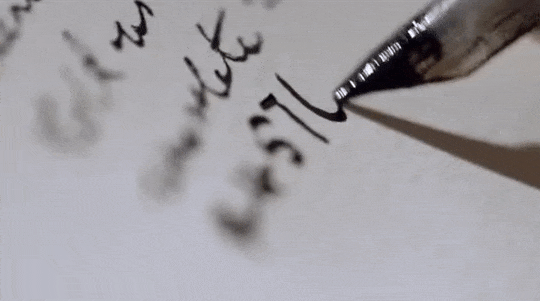
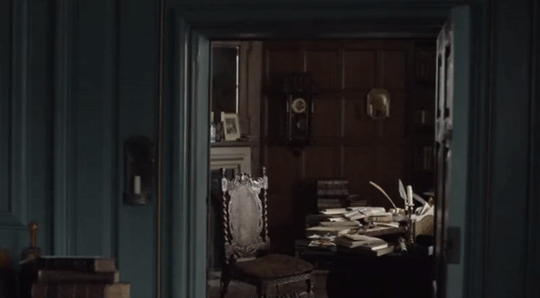
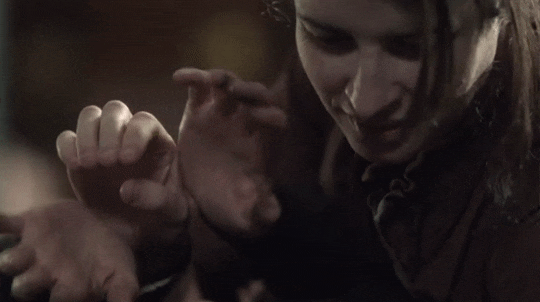
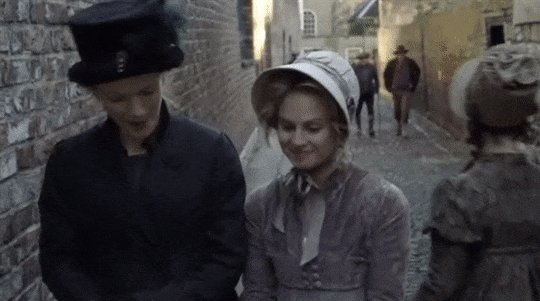
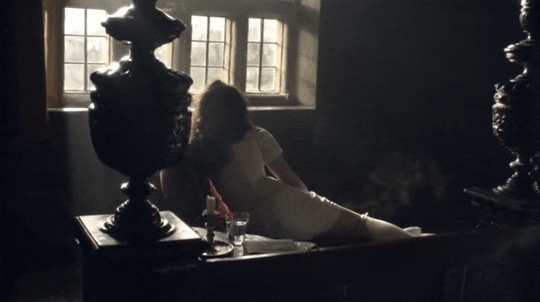
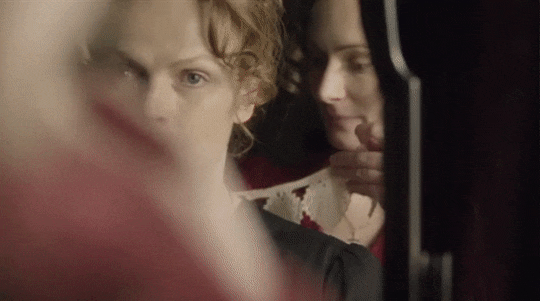
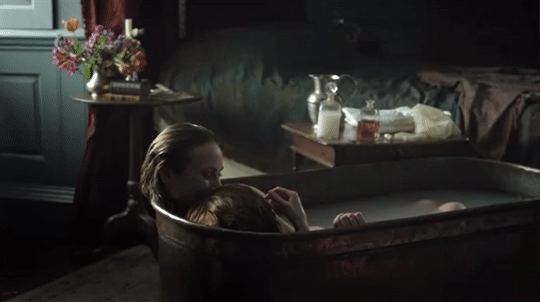

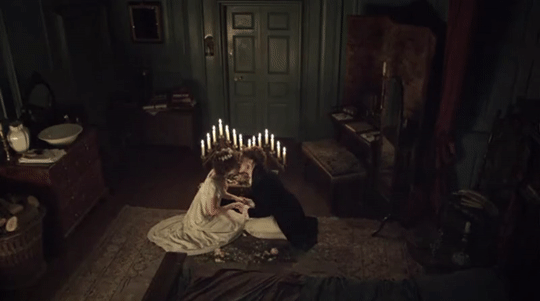
THE SECRET DIARIES OF MISS ANNE LISTER (2010) dir. James Kent Anne Lister is a young unmarried woman living in 19th-century Yorkshire with her aunt and uncle. The one thing she wants from life is to have someone to love and to share her life with, but the person she has in mind, her lover Mariana Belcombe, marries a rich widower and breaks off their affair. Depressed, Anne devotes her time to studying, while longing takes over her heart. A year after Mariana's wedding, Anne begins to think about finding another lover. (link in title)
#lgbt cinema#lesbian cinema#the secret diaries of miss anne lister#anne lister#uk#lgbt#lesbian#lgbt film#lgbt movie#lesbian film#lesbian movies#british cinema#british films#british movies#queer cinema#maxine peake#anna madeley#christine bottomley#2010#2010s#2010s movies#2010s films#2010s cinema
63 notes
·
View notes
Text
the whole anne and mariana story is sooo hard to watch but so well written because god i feel so bad for mariana and i completely understand where she's coming from but she's so emotionally manipulative and in s1 she said all those nasty things to anne about how she'll never going to find a woman who'll settle down with her and that she should also marry a man while literally being in the same bed with her and like that's impossible for me to forgive as much as i feel sorry for her like no matter how litte choices in life she had compared to anne saying all that and being like this was very much a choice. also the way anne is trying to move on while at the same time not wanting to lose a lesbian friend and also being still so sensitive and hurt over her is very realistic... i see people being frustrated at a 'love triangle' but i dont see it like that at all. anne is married to ann there's no question about that and anne had a huge history w mariana so it's obviously so hard for her to just move on... also these are lesbians in the 1880s like she probably felt like she had to be there for her even though their relationship was over
#it's so nuanced.....#i love how realistic everything is u can tell lesbians wrote this#gentleman jack
129 notes
·
View notes
Text
Mariana Lawton: Come to dinner with me tonight. I can’t cook but I’ll bring plenty of free wine.
Anne Lister: Marry me.
7 notes
·
View notes